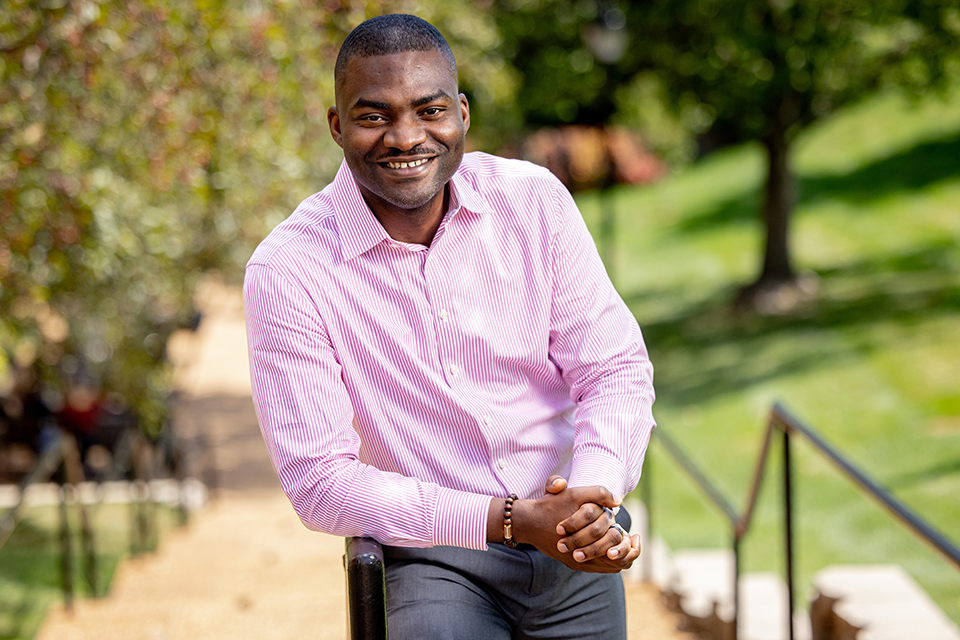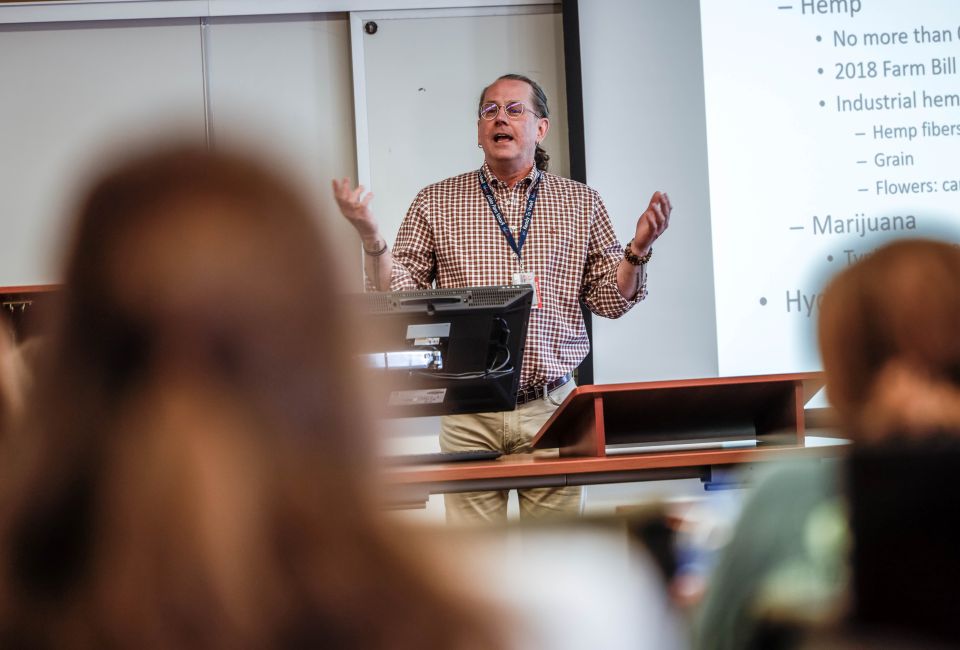Saint Louis University TIP Lab Kicks Off Project to Reduce Pickleball Injuries, Study Health Benefits
ST. LOUIS — Pickleball is the fastest-growing sport in the United States and offers a fun and social way to increase physical activity levels. With the explosion in participation has come a significant increase in pickleball-related injuries seen in U.S. emergency rooms. Still, this data does not offer an accurate picture of what types of injuries are most prevalent.
“Without accurate information on injuries, it will be difficult to develop strategies to prevent these injuries and allow people to access the benefits of increased activity in the safest way possible,” said Olu Owoeye, Ph.D., director of the Translational Sports Injury Prevention (TIP) Lab at Saint Louis University.

Olu Owoeye, Ph.D., director of the Translational Sports Injury Prevention Lab at Saint Louis University. Photo by Sarah Conroy.
The SLU TIP Lab is introducing SPIN, an acronym for Surveillance in Pickleball Players to reduce Injury burden, a multi-faceted, multi-year research project to address injury concerns with pickleball and study the health benefits that can be gained through pickleball participation.
SLU TIP Lab researchers aim to describe the most common pickleball-related injuries and devise data-driven prevention strategies through multiple phases of the SPIN Project. The initial phase is a participation and injury survey for pickleball players to complete online. This survey will provide the SPIN team with accurate information about how often participants play and the type and frequency of injuries that they are experiencing.
“We are recruiting 3,000 participants for this phase of the study from across all skill and age levels, age 18 and older, to give us the most accurate picture of pickleball injuries available to date,” said Owoeye, assistant professor of physical therapy at SLU.
Once this data has been analyzed, SLU TIP Lab researchers and expert partners will design prevention strategies to test for effectiveness and ease of adaptation. Additionally, the SPIN Project team will begin studies to determine what types of health benefits pickleball players can expect to gain from their pickleball play.
Owoeye explains, “We know that increased physical activity has many benefits, including lowering blood pressure, helping with maintaining a healthy weight and improving muscle strength, but because the increase in pickleball participation is so recent, we can’t accurately state how effective pickleball participation is at providing these and more benefits.”
The SPIN Project team partnered with PEAK Sport and Spine Physical Therapy, Dynamic Universal Pickleball Rating (DUPR), and the St. Louis Shock Professional Pickleball Club to help recruit participants for the injury survey. The SLU TIP Lab continues to seek additional partners to support this phase and additional phases of the SPIN project and the Umbrella Pickleball Project that incorporates trials to test the effectiveness of pickleball-specific injury prevention strategies and establish the health benefits of pickleball as a recreational sport.
“The recent burst in pickleball participation in the United States has provided a unique opportunity to study injuries and health benefits of a new activity almost from its inception,” Owoeye said. “The SPIN Project is positioned to provide a wealth of information to pickleball players, clubs, and equipment manufacturers on how to manage the risks and reap the benefits of pickleball most effectively going forward.”
Click here to participate in this research study. For more information, call Olu Owoeye at 314-977-8505 or email tip.lab@health.slu.edu.
Latest Newslink
- ‘A Model Human Being’: SLU Pediatrician Cared for Children with CancerDennis "Denny" M. O'Connor, M.D. (A&S '63, Med '67), professor emeritus of pediatrics at Saint Louis University School of Medicine, died Tuesday, Feb. 3, 2026. He was 83 years old. O'Connor dedicated more than 50 years to pediatric care, specializing in treating children with cancer, blood disorders and infectious diseases.
- SLU Golf and Give Innovation Challenge Set for February 24-25The third Golf and Give Innovation Challenge, led by Saint Louis University's School of Science and Engineering and the Chaifetz Center for Entrepreneurship in the Richard A. Chaifetz School of Business, will offer the SLU community two days of miniature golf on campus while helping to stock the Billiken Bounty food pantry.
- Rottnek Recognized by Catholic Health AssociationFred Rottnek, M.D., professor of family and community medicine at the Saint Louis University School of Medicine, has been named the 2026 winner of the Sister Carol Keehan Award by the Catholic Health Association (CHA). Created in honor of Sr. Carol Keehan, DC, for her work to ensure everyone has access to quality health care, the Sister Carol Keehan Award is given annually to someone who advances the healing mission of Jesus by valiantly advocating for a more equitable and compassionate health system.
- SLU Professor Wins Top Article Prize for Work on Women and ChristianityAmanda Izzo, Ph.D., associate professor of women and gender studies at Saint Louis University, has been awarded the Jane Dempsey Douglass Prize. The award honors the previous year's best published essay on the role of women in the history of Christianity.
- Photo Exhibit Highlighting Work of SLU's Jesuit Worldwide Learning Students Opens Thursday, February 5Unbound, a student photography exhibit featuring the work of Saint Louis University-Jesuit Worldwide Learning scholarship recipients living in Nigeria, Kenya, and Malawi, opens Thursday, Feb. 5. The SLU-JWL program allows marginalized students abroad to pursue a remote B.A. at SLU at no cost.
- The Academy of Science St. Louis to Honor SLU's Vasit Sagan at Outstanding St. Louis Scientists AwardsSaint Louis University researcher Vasit Sagan, Ph.D., a professor of geospatial science and computer science and associate vice president for geospatial science, will be honored by The Academy of Science - St. Louis with the George Engelmann Interdisciplinary Award for Collaborative Science Achievement.













